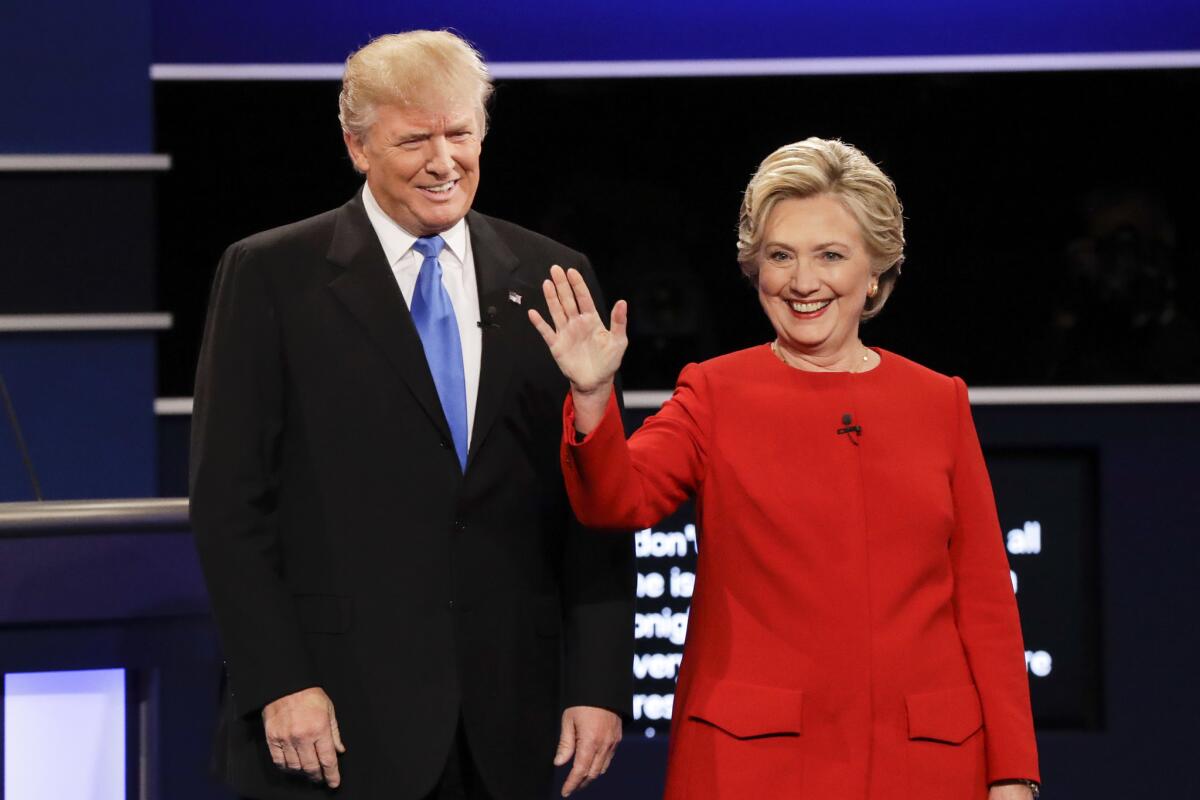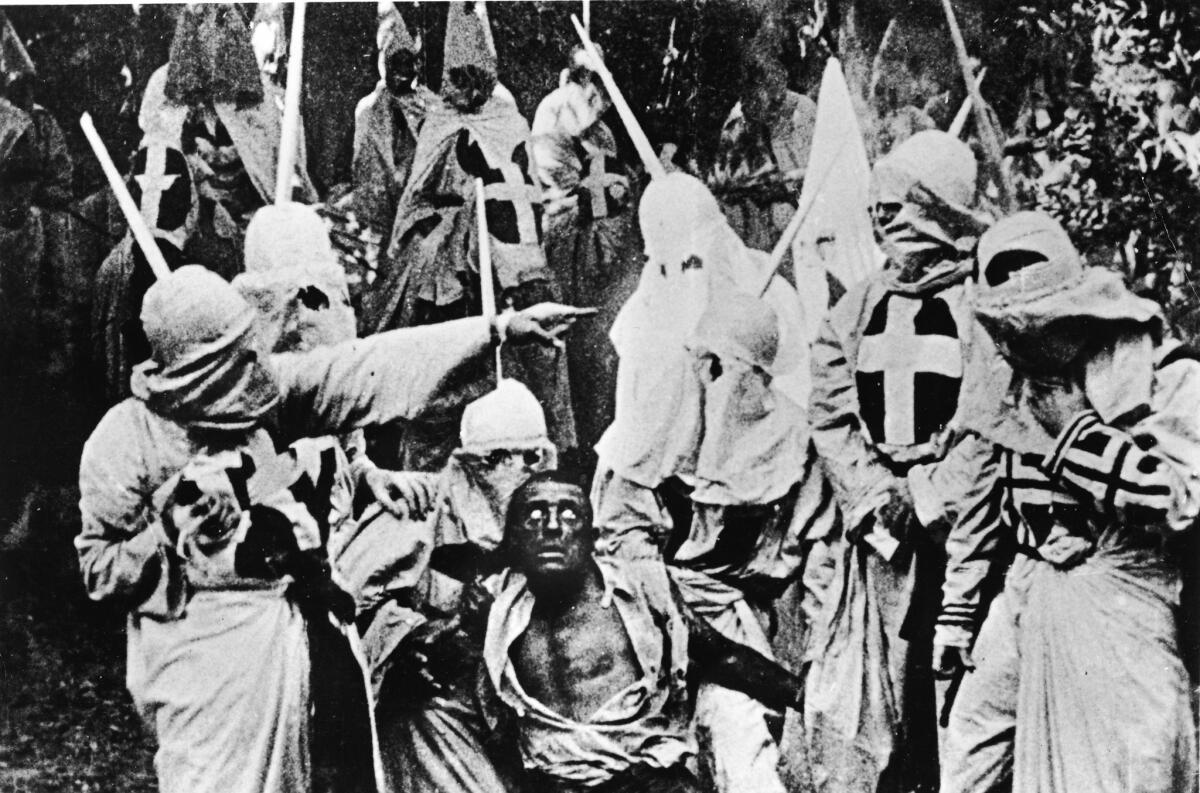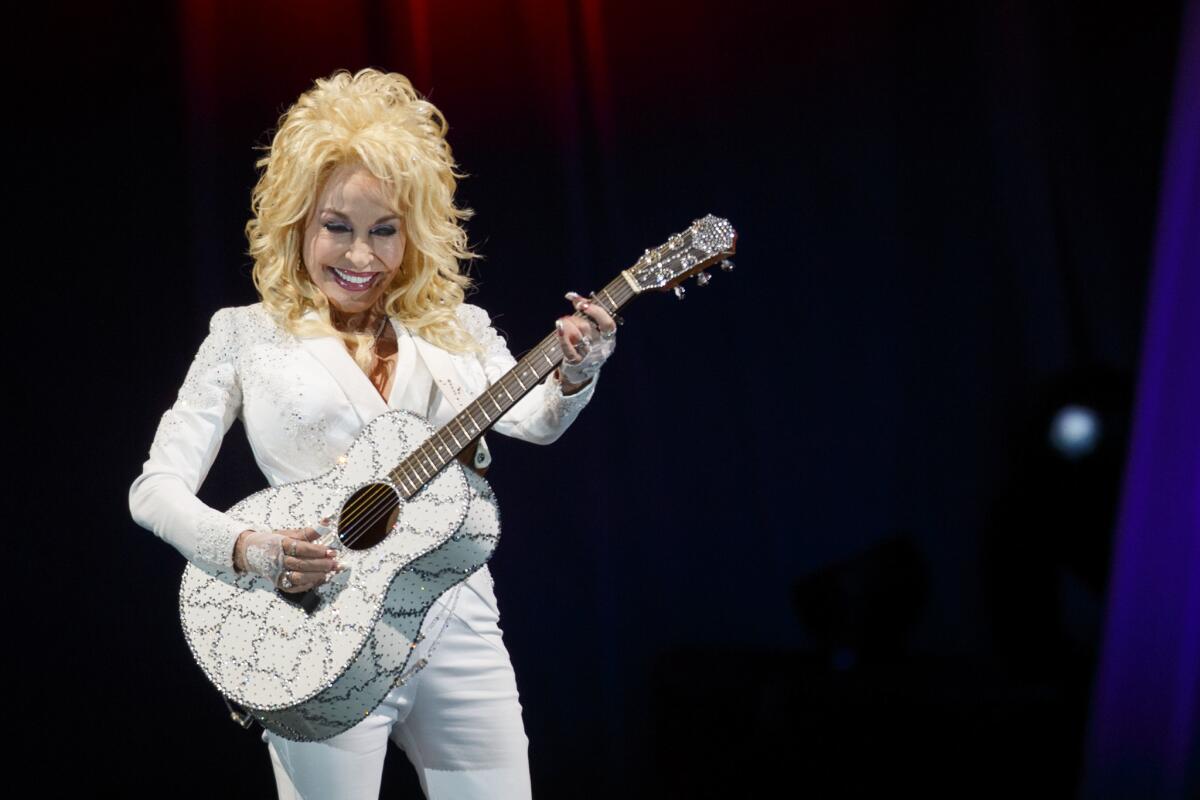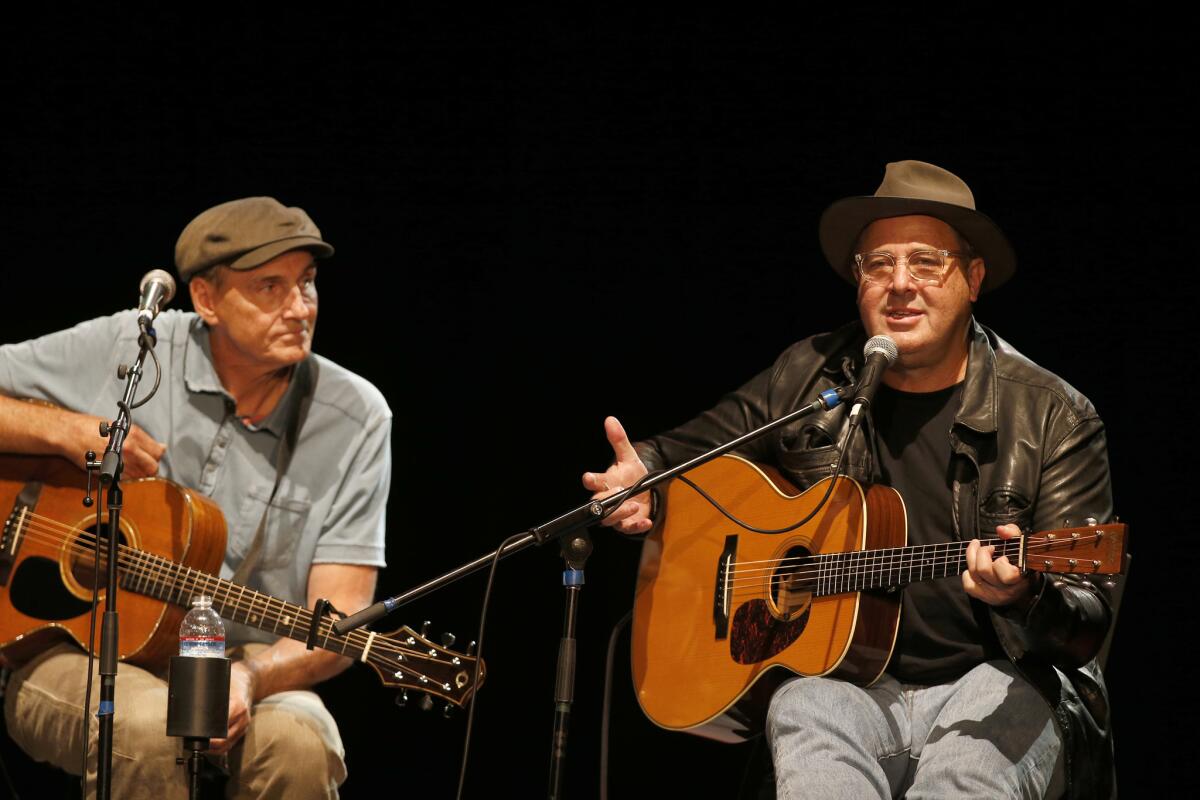Readers weigh in on the first presidential debate and the history of ‘The Birth of a Nation’

- Share via
Presidential debate played out as predicted
Regarding “Showdown Time” [Sept. 26]. My thanks to Mary McNamara and Charles McNulty, whose incisive pre-debate takes proved eerily prescient. McNamara illuminated the singularly challenging role of debate moderators, which she submits is to “return television coverage of the campaign to something approaching sanity.” McNulty aptly related how presidential debates once afforded intellectual drama but now amount to “theatrical free-for-alls” indulged to generate TV ratings bonanzas. With nothing of substance likely to change in the two remaining debates, I’ll forgo further Op-Ed pages fare and simply re-read what McNamara and McNulty wrote.
Ed Alston
Santa Maria
::
That 400-pound man is the perfect subject for a political cartoon. I breathlessly await.
Dottie Rodman
Torrance
::
I appreciated the fact that the audience was admonished to remain quiet by keeping them in the dark. In past debates the candidates seemed to play to the audiences to get applause as a way of getting approval for their positions. I did not miss or need to see the audience’s reaction. I liked making up my own mind about what was being said without being influenced by the candidates’ supporters.
Sheilah Palacios
San Gabriel
L.A.’s role in original ‘Birth’
I’m surprised that the article on “The Troubling Legacy of ‘The Birth of a Nation’ ” [Oct. 2] didn’t mention that Los Angeles was at the epicenter of our conflicted attitudes toward the film. More than a century ago, the all-too-familiar battles about free speech versus censorship, jobs versus social justice unfolded here. “Birth of a Nation” was shot entirely in Los Angeles. It was to have its world premiere on Feb. 8, 1915, at Clune’s Auditorium (since demolished) on Pershing Square. Citing racial prejudice, the City Council directed Police Chief Charles Sebastian to prevent the film from being shown.
D.W. Griffith went to court and secured a temporary injunction in favor of the film. Over 3,000 people attended the formal opening that night. The film went on to break all attendance records in Los Angeles and nationwide. And its feared impact on racial relations came to fruition as well. Sometimes, things don’t really change as much as one would expect in 100 years.
Bob Wolfe
Hermosa Beach
::
Once more, one of your journalists couldn’t help putting in a “zinger” about Donald J. Trump when comparing D.W. Griffith’s “The Birth of a Nation” with Nate Parker’s film of the same name. No opportunity seems to be passed up by your writers to make derogatory comments about Trump while giving Hillary Clinton wide berth on her many, many past transgressions. This is only the latest of this solidly left bent, and I’ve had enough.
Rose Middleton
Northridge
Conflict at a crossroads
The Calendar section [Oct. 2] captures the essence of the conflict roiling America. You hit on the broad themes we face as a country and which are too often segmented and treated as separate. The subjugation of women with sexual violence poignantly addressed by Tori Amos [“A Voice Fighting Sexual Violence”]. The subjugation of black people and minorities given full license in the original “The Birth of a Nation” film [“The Troubling Legacy of ‘The Birth of a Nation’ ”]; and the white boys, whose drug/alcohol-induced actions perpetuate the subjugation of women and minorities as discussed in the “Youth Culture on a High in Films.” The intersection of women’s pain, black and minority pain, and, yes, the pain of white boys doing stupid things is all too real. Is it too much to ask the news media to begin to see that racism, misogyny and addiction are branches of the same tree.
Aviyah Farkas
Los Angeles
Sorry to have missed her show
Regarding your pop music review “Dolly, Pure and Simple” [Oct. 3]: Thanks for the really well-crafted review. Wish I could have been there.
Michael P. Scott
Indianapolis
Diversity in film not historical
One of your readers recently wrote praising the “milestone of diversity” in the recent remake of “The Magnificent Seven” [“Feedback: Seven Sword Samurai Salute,” Oct. 2] and seemed to criticize the “monochromatic cast” of Akira Kurosawa’s “Seven Samurai,” saying, “I don’t think there is a single non-Japanese actor in ‘Seven Samurai.’ ” If I remember correctly, “Seven Samurai” took place in 16th century Japan. At that time, who else lived in Japan? We should choose historical correctness over political correctness every time.
Garey Fong
Eagle Rock
Classic film is still fresh
Regarding “Once Banned, ‘Battle of Algiers’ ’ Smart, Compassionate Take on Terror and Rebellion Resonates Today” [Sept. 29, latimes.com]. It’s great to see Justin Chang keeping the classic film alive!
Tony Macklin
Las Vegas
An education from the best
Regarding “Master Class: James Taylor and Joe Walsh Are Among the Stars Swapping Songs at Country Hall of Fame Benefit” [Sept. 29]: Thank you for your fine piece. A delight to read. Some very nice touches.
Luís Torres
Pasadena

I’m surprised that the article on “The Troubling Legacy of ‘The Birth of a Nation’” [Oct. 2] didn’t mention that Los Angeles was at the epicenter of our conflicted attitudes toward the film. More than a century ago, the all-too-familiar battles about free speech versus censorship, jobs versus social justice unfolded here. “Birth of a Nation” was entirely shot in Los Angeles. It was to have its world premiere on Feb. 8, 1915, at Clune’s Auditorium (since demolished) on Pershing Square. Citing racial prejudice, the City Council directed Police Chief Charles Sebastian to prevent the film from being shown. D.W. Griffith went to court and secured a temporary injunction in favor of the film. Over 3,000 people attended the formal opening that night. The film went on to break all attendance records in Los Angeles and nationwide. And its feared impact on racial relations came to fruition as well. Sometimes, things don’t really change as much as one would expect in 100 years.
Bob Wolfe
Hermosa Beach
::
Once more, one of your journalists couldn’t help putting in a “zinger” about Donald J. Trump when comparing D.W. Griffith’s “The Birth of a Nation” to Nate Parker’s film of the same name. No opportunity seems to be passed up by your writers to make derogatory comments about Trump while giving Hillary Clinton wide berth on her many, many past transgressions. This is only the latest of this solidly left bent and I’ve had enough.
Rose Middleton
Northridge
Sorry to have missed the show

Regarding “Pop Music Review: Dolly, Pure and Simple” [Oct. 3]. Thanks for the really well crafted review. Wish I could have been there.
Michael P. Scott
Indianapolis
Diversity not historical
One of your readers recently wrote praising the “milestone of diversity” in the recent remake of “The Magnificent Seven” [“Feedback: Seven Sword Samurai Salute,” Oct. 2] and seemed to criticize the “monochromatic cast” of Akira Kurosawa’s “Seven Samurai” saying, “I don’t think there is a single non-Japanese actor in ‘Seven Samurai.’” If I remember correctly, “Seven Samurai” took place in 16th century Japan. At that time, who else lived in Japan? We should choose historical correctness over political correctness every time.
Garey Fong
Eagle Rock
Classic film still fresh
Regarding “Once Banned, ‘Battle of Algiers’’ Smart, Compassionate Take on Terror and Rebellion Resonates Today” [Sept. 29, latimes.com]. It’s great to see Justin Chang keeping the classic film alive!
Tony Macklin
Las Vegas
An education for the best

Regarding “Master Class: James Taylor and Joe Walsh are Among the Stars Swapping Songs at Country Hall of Fame Benefit” [Sept. 29]. Thank you for your fine piece. A delight to read. Some very nice touches.
Luís Torres
Pasadena
Intersecting conflicts
The Calendar section [Oct. 2] captures the essence of the conflict roiling America. You hit on the broad themes we face as a country and which are too often segmented and treated as separate. The subjugation of women with sexual violence poignantly addressed by Tori Amos [“A Voice Fighting Sexual Violence”]. The subjugation of black people and minorities given full license in the original “The Birth of a Nation” film [“The Troubling Legacy of ‘The Birth of a Nation’”]; and the white boys, whose drug/alcohol-induced actions perpetuate the subjugation of women and minorities as discussed in the “Youth Culture on a High in Films.” The intersection of women’s pain, black and minority pain, and yes the pain of white boys doing stupid things is all too real. Is it too much to ask of reporters, news media, to begin to see that racism, misogyny and addiction are branches of the same tree.
Aviyah Farkas
Los Angeles
More to Read
Only good movies
Get the Indie Focus newsletter, Mark Olsen's weekly guide to the world of cinema.
You may occasionally receive promotional content from the Los Angeles Times.











